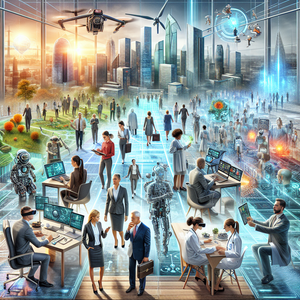
Emerging Careers Shaped by Workforce Demographics: Adapting to a Shifting Labor Market
The global workforce is undergoing significant transformation, driven by powerful demographic shifts. As populations age, workplaces diversify, and younger generations redefine professional expectations, employers and job seekers alike must adapt to this evolving landscape. These trends are not just statistical realities—they're reshaping the very fabric of industries and professions.
Job Summaries:
Diversity and Inclusion Officer:
- D&I Officers are crucial as workplaces reflect multicultural societies.
- They implement strategies for equity, inclusivity, and belonging.
- Address systemic biases and conduct unconscious bias training.
- Analyze workforce data to promote diverse organizational cultures.
- Qualifications: Bachelor's degree in sociology, human resources, or organizational psychology.
- Experience in leading diversity initiatives is essential.
- Impact includes higher employee satisfaction.
- Companies with diverse teams see up to 35% better financial performance.
Workforce Demographics Analyst:
- Analyzing workforce composition—age, ethnicity, education, and geographic distribution—has become critical for long-term planning.
- Workforce Demographics Analysts use data to identify trends, forecast challenges, and help organizations adapt to shifting labor market realities.
- Qualifications include a degree in sociology, labor economics, or data analytics, often supplemented by advanced statistical training.
- These analysts empower organizations to close talent gaps, plan for generational transitions, and future-proof their workforce strategies.
Talent Acquisition Specialist:
- The competition for top talent has intensified as labor markets shrink and job seekers prioritize values like diversity and flexibility.
- Talent Acquisition Specialists design recruitment strategies that appeal to modern candidates, often leveraging technology and community partnerships to attract a wider pool of applicants.
- Qualifications include a bachelor’s degree in business, human resources, or communications, with expertise in recruitment marketing and applicant tracking systems.
- These specialists help organizations attract diverse, high-performing teams in competitive job markets.
Gerontologist:
- As populations age, the need for professionals specializing in the aging process is skyrocketing.
- Gerontologists focus on the biological, psychological, and social aspects of aging, often designing care programs, conducting research, and advocating for policies that support older adults.
- Qualifications include a degree in gerontology, public health, or social work, often combined with certifications in aging studies.
- Gerontologists provide solutions for an aging workforce while contributing to the well-being of retirees, ensuring their continued participation in society.
Occupational Health and Safety Specialist:
- With older employees remaining in the workforce longer, companies must prioritize workplace safety tailored to their needs.
- Occupational Health and Safety (OSH) Specialists assess risks, implement ergonomic solutions, and develop training programs to mitigate workplace injuries.
- Qualifications include a degree in occupational health, engineering, or public health, with certifications such as CSP (Certified Safety Professional).
- By creating safer environments, OSH Specialists boost productivity and morale in age-diverse workplaces.
Generational Workforce Consultant:
- As multiple generations—from Baby Boomers to Gen Z—work side by side, navigating generational differences has become a priority.
- Generational Workforce Consultants help organizations design policies that enhance collaboration, promote inclusivity, and address varying workplace expectations.
- Qualifications include a degree in organizational psychology, business, or communications, with a focus on change management.
- These consultants foster harmonious, high-performing teams by bridging generational gaps.
Immigration and Workforce Policy Advisor:
- Migration patterns are reshaping labor markets worldwide.
- Immigration and Workforce Policy Advisors analyze trends, make policy recommendations, and assist organizations in integrating immigrant talent to address labor shortages and foster economic inclusion.
- Qualifications include a degree in public policy, international relations, or economics, alongside a strong understanding of labor laws.
- These advisors play a crucial role in creating inclusive policies that balance labor supply and demand.
Human Resources Technology Specialist:
- The digital transformation of HR functions has accelerated, driven by demographic and technological changes.
- HR Technology Specialists implement software solutions that support diverse, flexible, and hybrid workforces, from AI-driven hiring tools to accessible employee platforms.
- Qualifications include a degree in IT, human resources, or business analytics, complemented by HRIS (Human Resources Information Systems) certification.
- These specialists streamline HR processes, fostering efficiency and inclusivity in the workplace.
Labor Economist:
- Understanding the economic implications of demographic changes is critical for workforce planning.
- Labor Economists analyze data on wages, employment, and demographic trends, providing insights for policymakers and businesses.
- Qualifications include a background in economics, mathematics, or public policy, often requiring a graduate degree.
- Their research informs policy decisions that address demographic challenges like talent shortages or wage disparities.
Healthcare Workforce Planner:
- The aging population places significant demands on healthcare systems, creating a need for strategic workforce planning.
- Healthcare Workforce Planners assess future needs, develop training programs, and establish policies to ensure healthcare access.
- Qualifications include a degree in public health, healthcare administration, or workforce development.
- Their work ensures adequate staffing and resources to meet the growing demand for elder care and chronic disease management.
Employee Engagement Specialist:
- Modern employees, particularly Millennials and Gen Z, value meaningful work and strong workplace culture.
- Employee Engagement Specialists design surveys, lead team-building initiatives, and advise leadership on strategies to improve morale.
- Qualifications include a background in business, psychology, or human resources, with a focus on workplace culture.
- High employee engagement correlates with increased retention and productivity, helping organizations thrive in competitive markets.
Urban Workforce Development Coordinator:
- Urban areas face unique workforce challenges, from skill mismatches to economic inequality.
- Urban Workforce Development Coordinators create training programs, partner with local organizations, and advocate for inclusive economic policies.
- Qualifications include a degree in public administration, social work, or education.
- These professionals empower urban populations with the skills and opportunities needed to succeed in modern economies.
Demographic shifts are fundamentally altering the labor market, but they also present immense opportunities for innovation and growth. The careers highlighted above reflect how these trends are shaping the future of work, offering pathways for individuals and organizations to adapt and thrive. As the workforce continues to evolve, those who embrace these changes—whether by pursuing these roles or supporting their development—will be well-positioned to succeed. The future is here, and it belongs to those prepared to navigate a workforce reshaped by diversity, generational change, and the demands of an aging population. Are you ready to adapt?
Explore More Jobs

